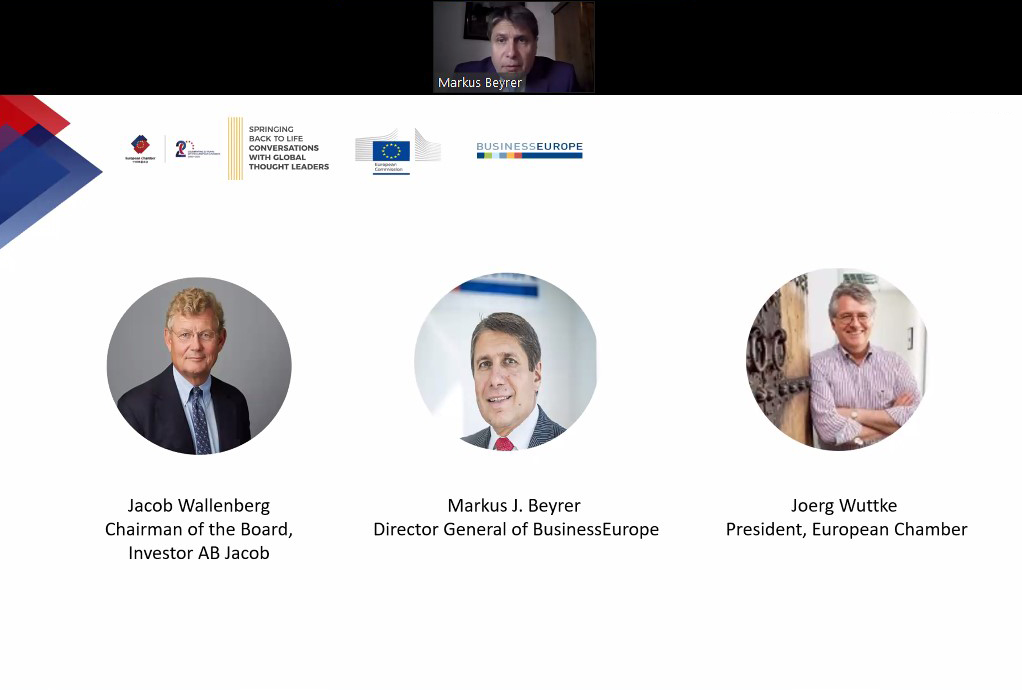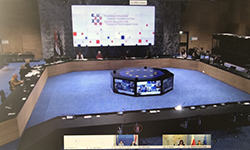BusinessEurope Headlines No. 2020-17
COVID-19 changes the pace but not the direction of EU-China relations

“As we approach the second month of lockdown measures across Europe, businesses are facing an incredibly difficult and complex economic situation. The sudden decrease of supply from China, the shutdown of work sites in Europe, and border closures have affected us all. We have called for emergency measures to alleviate the impact, and are now focusing on exit and recovery strategies to avoid long-term scars to the European economy”, Markus J. Beyrer, Director General of BusinessEurope said in a webinar on EU-China relations co-organised today with the European Union Chamber of Commerce in China. The European Commissioner for Trade, Phil Hogan, was the keynote speaker at the event. The COVID-19 pandemic has raised a number of questions on whether businesses need to diversify supply chains away from China and on the possibility of reshoring so-called strategic industries. “Simply ‘bringing back’ certain parts of the supply chain will not be easy. There need to be sound competitive reasons for companies to establish themselves wherever they choose to do so. What we might see is that companies will relocate part of their supply chain to other markets to make them more resilient, perhaps to Europe, but not necessarily”, Beyrer continued. In January, BusinessEurope published its China strategy, calling for a rebalancing of the economic relationship. “We need an ambitious trade agenda to aid our recovery, including the Comprehensive Agreement on Investment with China. But we need to rebalance the relationship with China more broadly. There are a number of very valid concerns about the irritants European companies experience in the Chinese market, in our home market, and on third markets. We will therefore continue supporting the EU’s approach towards China in line with the four key objectives of our recent China strategy,” Beyrer concluded.
![]() Contact: Maurice Fermont
Contact: Maurice Fermont
Video message: we need an ambitious recovery plan
Watch our Director General Markus J. Beyrer explain why.
EPSCO Council: well-functioning short-time work schemes are essential
 All efforts need to be undertaken to help companies and workers survive the coronavirus crisis. Coordinated and effective labour market responses across Europe are an important priority. It is essential to achieve in all EU Member States well-performing short-time working schemes, with the close involvement of national social partners. Appropriate health and safety measures at the workplace are needed to ensure a safe return to economic activity, as well as growth-oriented social investments to support the recovery. These were the key messages by Director General Markus J. Beyrer in a video call informal meeting of the Employment, Social Policy, Health and Consumer Affairs (EPSCO) Council, held on 5 May.
All efforts need to be undertaken to help companies and workers survive the coronavirus crisis. Coordinated and effective labour market responses across Europe are an important priority. It is essential to achieve in all EU Member States well-performing short-time working schemes, with the close involvement of national social partners. Appropriate health and safety measures at the workplace are needed to ensure a safe return to economic activity, as well as growth-oriented social investments to support the recovery. These were the key messages by Director General Markus J. Beyrer in a video call informal meeting of the Employment, Social Policy, Health and Consumer Affairs (EPSCO) Council, held on 5 May.
Contact: Maxime Cerutti
EU migration policy in the post-COVID recovery
 It is important to consider the next steps of EU migration policy in view of the rapidly changing economic and social realities in Europe in the wake of the COVID-19 crisis. Some sectors are in need of third country seasonal migration, but our societies’ capacity to integrate new migrants cannot be overestimated at a time when unemployment is increasing across Europe. To support Europe’s recovery, a more coordinated EU migration policy is what is needed to attract economic migrants in line with Europe’s changing needs. BusinessEurope also remains committed to the existing partnership on integration of refugees. These were the key messages given by Maxime Cerutti, Director for Social Affairs, during a meeting of the European economic and social partners with the European Commissioner for Home Affairs Ylva Johansson on 5 May.
It is important to consider the next steps of EU migration policy in view of the rapidly changing economic and social realities in Europe in the wake of the COVID-19 crisis. Some sectors are in need of third country seasonal migration, but our societies’ capacity to integrate new migrants cannot be overestimated at a time when unemployment is increasing across Europe. To support Europe’s recovery, a more coordinated EU migration policy is what is needed to attract economic migrants in line with Europe’s changing needs. BusinessEurope also remains committed to the existing partnership on integration of refugees. These were the key messages given by Maxime Cerutti, Director for Social Affairs, during a meeting of the European economic and social partners with the European Commissioner for Home Affairs Ylva Johansson on 5 May.
Contact: Robert Plummer
Calendar 
- 5 June: BusinessEurope Council of Presidents
- 22-26 June: EU Sustainable Energy Week 2020
- 9-10 September: 8th International Conference on Sustainable Development
Reminder: please have a look at our privacy policy